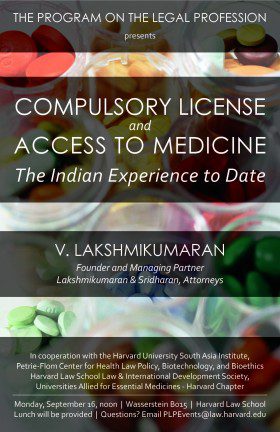Global Health Seminar
V Lakshmikumaran, Founder and Managing Partner, Advocate and Patent Agent, Lakshmikumaran & Sridharan Attorneys
Mr. Lakshmikumaran’s talk will focus on India’s compulsory licensing regime, which can be used to mandate that an IP holder license its IP right to another company or individual for a fee. In 2012, India’s government first exercised its power to issue a compulsory license, allowing a generic pharmaceutical company, Natco, to manufacture a version of the cancer-fighting drug, Nexavar, developed by Bayer, after finding, among others, the branded drug to be cost-prohibitive for India. This action is being closely watched worldwide because of the important role played by Indian companies in supplying affordable generic versions of medicines globally. In March 2013, the Indian Patent Appeals Body rejected an appeal from Bayer; the case is now before the High Court of Bombay. If upheld, the development of this regime may be a game changer for global health, opening the way for other Indian generic pharmaceutical companies to seek compulsory licenses to manufacture cheaper version of essential drugs. In fact, further applications have already been filed against Bristol-Meyers Squibb and Roche for other cancer-fighting drugs. Mr. Lakshmikumaran will discuss recent global trends in compulsory licensing, examine the Indian legal framework, and discuss the lessons of the Nexavar dispute. He will also explore the compatibility of India’s compulsory licensing regime with the WTO’s TRIPS Agreement.
Sponsored by the Harvard Law School Program on the Legal Profession

